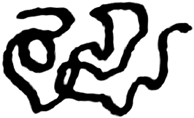Let us consider various characteristics of voluntary and involuntary
acts.
In the case of lifting the heavy weight, the various experiences of
effort are obviously most characteristic for lifting the weight
voluntarily.
On the other hand, compare with this the case of writing,
voluntarily, here in most
118.
of the ordinary cases there will
be no effort; and even if we feel that the writing tires our hands and
strains their muscles, this is not the experience of
“pulling” and “pushing” which we
would call typical voluntary actions.
Further compare the lifting of your hand when you lift a weight with
lifting your hand when, e.g., you point to
some object above you.
This will certainly be regarded as a voluntary act, though the
element of effort will most likely be entirely absent; in fact
this raising of the arm to point at an object is very much like
raising the eye to look at it, and here we can hardly conceive of
an effort. ‒ ‒
Now let us describe an act of involuntary raising your arm.
There is the case of our experiment, and this was characterized
by the utter absence of muscular strain and also by our observant
attitude towards the lifting of the arm.
But we have just seen a case in which muscular strain was absent, and
there are cases in which we should call an action voluntary although
we take an observant attitude towards it.
But in a large class of cases it is the peculiar impossibility of
taking an observant attitude towards a certain action which characterizes
it as a voluntary one: Try, e.g., to
observe your hand rising when you voluntarily raise it.
Of course you
see it rising as you do, say, in the
experiment; but you can't somehow follow it in the same way
with your eye.
This might get clearer if you compare two different cases of following
lines on a piece of paper with your eye;
A) some
irregular line like this:

,
B)
a written sentence.
You will find that in
A) the eye, as it were,
alternately slips and gets stuck, whereas
119
in reading a sentence it glides
along smoothly.